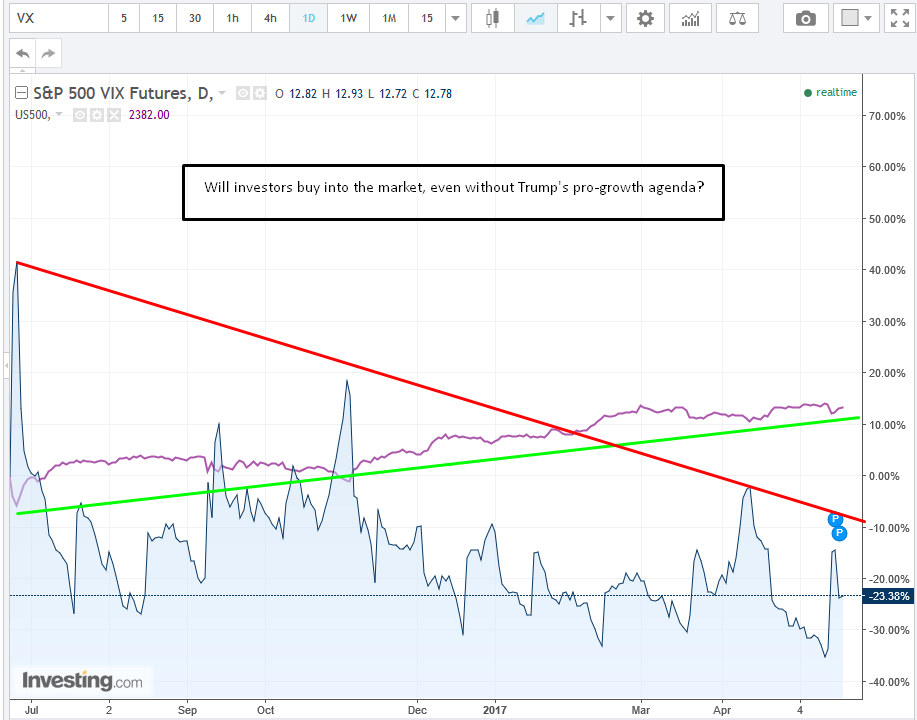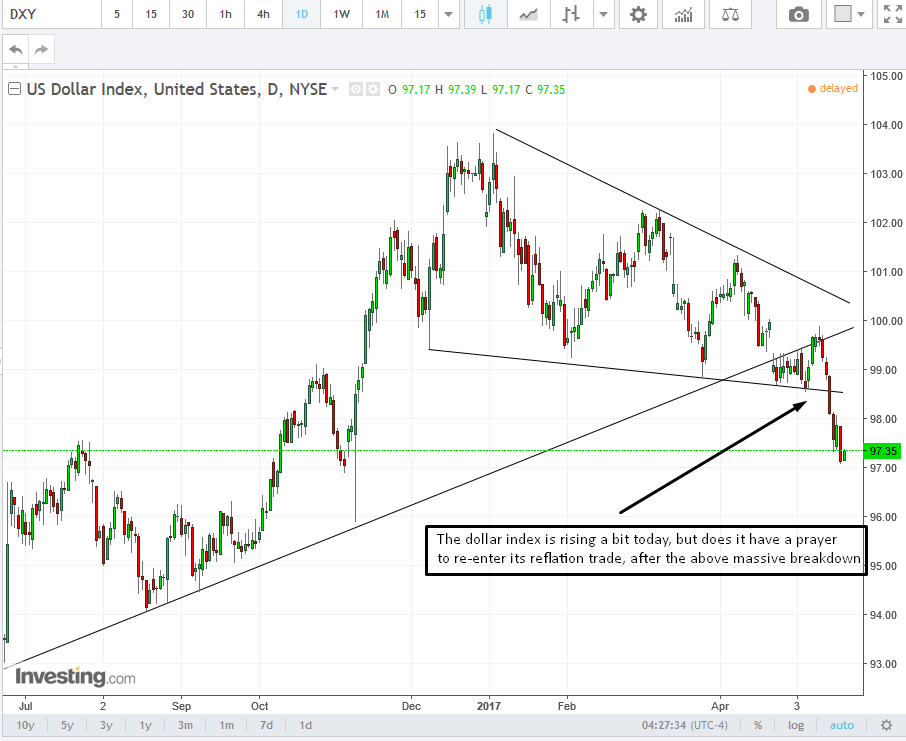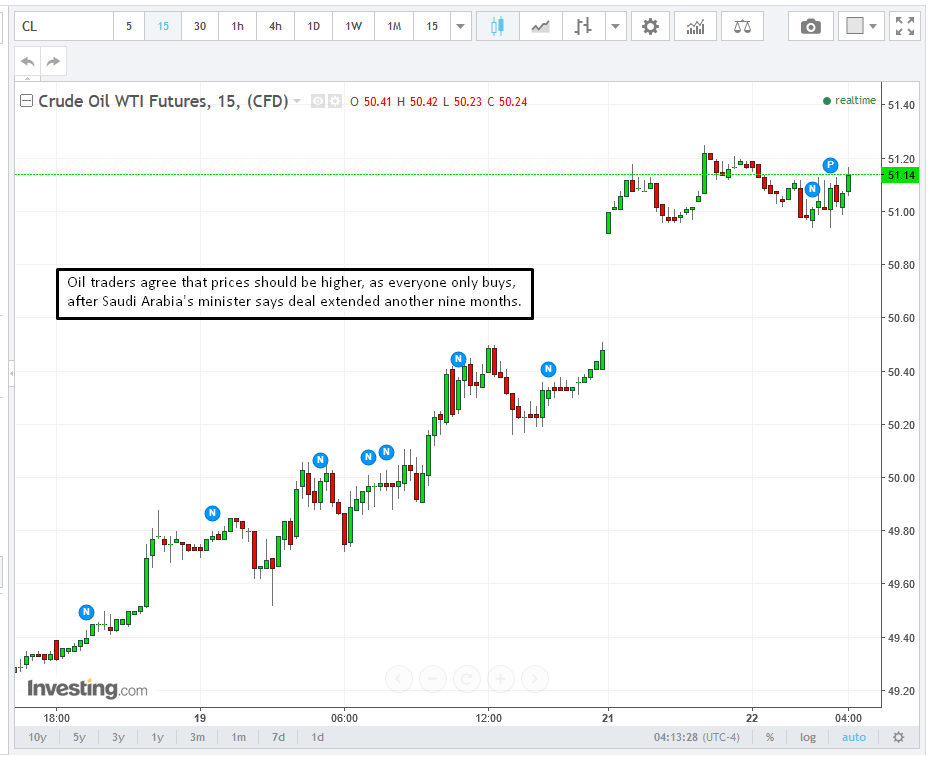by Pinchas Cohen
The Big News
Oil almost reached $51 a barrel yesterday at 22:02 EDT – its highest level in a month - after Saudi Arabia said an agreement had been reached to extend the deal on production cuts.
Oil wasn't the only gainer today. Asian stock exchanges, except for the Shanghai Composite, and the European and US futures markets are all in the green, as the yen, gold and bonds are being sold on easing volatility.
World Events
The gods of oil—aka OPEC and NOPEC—drive today’s market. Once again, we see the rise in oil tied to the power bestowed by traders into the hands of the oil producing countries as their leader, Saudi Arabia’s energy minister, said all participants in last November’s deal agreed to extend cuts not by the mere six months originally proposed but by a whopping nine months in total. Energy and raw-materials posted the biggest gains on the MSCI Asia Pacific.
On the other end of Asia, North Korea conducted another ballistic missile test on Sunday, yet the South Korean won surged, and the pound declined last night, after the UK threatened to exit Brexit negotiations, but pared most of its losses since.
In our Week Ahead post yesterday, we suggested that a successful trip by US President Donald Trump may divert investors’ attention away from political risk, and that appears to be the case right now, as global equities are closing in on record highs, after US companies signed multi-billion dollar deals in the defense, energy and infrastructure industries with the Saudis.

However, even as investors ride up prices, political risk remains. Jason Chaffetz, the Republican chairman of the House Oversight and Government Reform Committee said he’ll talk to fired FBI chief James Comey today and will be pursuing records of the President’s meetings with Comey.
Meanwhile, in Brazil, President Michel Temer is being overwhelmed by allegations of corruption and a cover-up after the country’s influential bar association voted in favor of his impeachment. This political scandal spurred the biggest selloff on Brazil's benchmark Bovespa stock index since the 2008 financial crisis. The benchmark index is down 8.8%, and trading had been halted for an hour after a 10% drop triggered a circuit-breaker mechanism.
Today's Key Events
- Brazil’s central bank will release an economic survey of forecasts for its key interest rate, as traders trim bets on an initially higher than expected rate cut, as yield paid on Brazilian interest rate futures spiked when traders bet the central bank would be forced to cut rates at a slower pace as the reforms outlook dimmed.
- Fed officials Patrick Harker and Neel Kashkari are both scheduled to speak Monday.
Market Moves
Currencies

- The dollar index is up 0.25% at 97.379, as of 3:54 EDT after a weekly loss of 2.13 percent, its worst weekly performance since April 2016.
- The Brazilian real slumped 8% to 3.38 reals per U.S. dollar, the biggest percentage drop since the currency was devalued in 1999, wiping out its gains in 2017, while bond prices tumbled.
- The yen fell 0.2 percent to 111.48 per dollar, after strengthening as much as 2 percent – like oil - last week.
- The Aussie fell 0.2 percent to 74.42 U.S. cents.
- The won jumped 0.9 percent, erasing almost all its losses over the previous three sessions, even after additional North Korean missile launches, as it tests the resolve of new and dovish South Korean President Moon Jae-in. The new President turned to a long-time public official for his finance chief as he named key advisers and cabinet posts.
- The pound lost 0.3 percent, falling to $1.3002. EU ministers meet in Brussels on Monday to discuss their Brexit negotiating position after the U.K. threatened to quit talks on its departure unless the bloc drops its demands for a divorce payment as high as 100 billion euros ($112 billion).
- The euro slipped 0.1 percent to $1.1192.
Commodities

- Oil jumped on a gap last night,1.08%, to a high of $50.89 – extending Friday's 2.00 percent advance - but nervous traders weren’t able to breath at those heights and scaled down gains to $50.70, for a more modest gain of 0.73%, as of 4:05 EDT.
- Gold slid 0.2 percent to $1,253.56 an ounce, paring last week’s 2.2 percent gain.
Stocks
- Japan’s TOPIX index rose 0.5 percent. The measure lost 1.3 percent last week. Australia’s S&P/ASX 200 Index climbed 0.8 percent and South Korea’s KOSPI Index advanced 0.6 percent.
- Hong Kong’s Hang Seng climbed 1 percent to its highest point since July 2015. The Hang Seng China Enterprise Index jumped 1.1 percent. The Shanghai Composite slipped 0.7 percent.
- S&P 500 Futures rose 0.1 percent after the underlying gauge increased 0.7 percent on Friday. Friday’s climb was curbed by reports that investigators are focused on a current White House official as a person of interest in the Russia probe.
Bonds
- Ten- year Treasury yields rose two basis points to 2.25 percent. Treasuries had their best week in a month last week.
- The yield on Australian government notes with a similar maturity rose one basis point to 2.49 percent.
